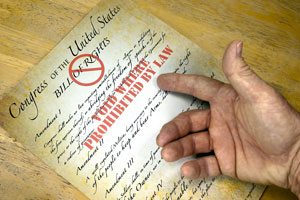Contributed by Jen Krausz, Bethlehem, PA
Warm-up Question
When have you felt most free? What life circumstances seem to take away your freedom?
I’m Talking About Freedom
A school district may not ban students from creating banners containing Bible verses, a Texas judge ruled last week. Judge Steven Thomas has granted an injunction filed by the Kountze High School cheerleaders to allow them to continue creating and displaying Bible verse banners at their sporting events.
verses, a Texas judge ruled last week. Judge Steven Thomas has granted an injunction filed by the Kountze High School cheerleaders to allow them to continue creating and displaying Bible verse banners at their sporting events.
School officials had stopped the students from displaying banners with scripture and religious messages such as “If God is for us, who can be against us” after a complaint by the Freedom From Religion Foundation. The foundation says that the banners violate the first amendment, which prevents government from establishing or endorsing a religion.
Texas Governor Rick Perry and Attorney General Greg Abbott support the cheerleaders in this case. Abbott said that the students create the banners without school funding, which makes them individual speech protected, not banned, by the first amendment. “This is student-led expression, and that’s perfectly constitutional,” Abbott said.
In response, the foundation accused Abbott of abusing his elected position to support religious views.
Governor Perry had this to say about the issue: “Anyone who is expressing their faith should be celebrated, from my perspective, in this day and age of instant gratification, this me-first culture that we see all too often,” Perry said. “We’re a nation built on the concept of free expression of ideas. We’re also a culture built on the concept that the original law is God’s law, outlined in the Ten Commandments.”
Discussion Questions
- Do you think society is better off without public displays of people’s religious beliefs? Why or why not?
- The First Amendment says, “Congress shall make no law respecting an establishment of religion, or prohibiting the free exercise thereof…” Sometimes the “establishment” and “free exercise” clauses are in tension because rigorously enforcing one appears to undermine the other. If you were the judge in this case, how would you rule? Why?
Scripture Texts (NRSV) for Sunday, October 28, 2012 (Reformation Sunday)
(Text links are to Oremus Bible Browser. Oremus Bible Browser is not affiliated with or supported by the Evangelical Lutheran Church in America. You can find the calendar of readings for Year C at Lectionary Readings.)
For lectionary humor and insight, check the weekly comic Agnus Day.
Gospel Reflection
Everyone likes freedom, don’t they? Who wouldn’t want to be free? The human spirit is created to want freedom. All over the world, where people are oppressed, they long for freedom. But what is true freedom? What looks like freedom on one side of a political controversy (such as the one in our news story) feels like coercion to those on the other side. Our gospel text this week says clearly that true freedom is bigger than politics and can only be found in Jesus Christ, who is truth.
That’s really good news. No matter what situation we find ourselves in, we can experience freedom from sin and from the consequences of sin. This goes far deeper than being allowed to do whatever we want, or even allowed to do things we think are important to life. If we accept and follow Christ, we have a freedom no government or politician can ever take away from us.
We are fortunate to live in a country where freedom is valued and protected. Our country was created intentionally to maximize the freedoms of its people. We’ve always had this freedom. Do we sometimes take it too lightly because we have not had to work for it? We haven’t experienced a world without it.
The same may be true of the spiritual freedom these verses describe. If you’ve grown up in church (I have) and always remembered believing (I have), you may never have felt the guilt, the fear, the intense desperation that comes from believing that your mistakes may literally be the death of you. Reflect on the magnitude of the sacrifice Jesus made for us on the cross, and realize the price He paid for our freedom. And if that doesn’t make you feel awe, gratitude, and appreciation for that freedom, I don’t know what will!
Discussion Questions
- Is there a difference between government-given freedom and God-given freedom? If so, what is the difference?
- How would your life be different without political freedoms?
- How would your life be different without the freedom you have in Christ
- What can you do to express appreciation for the freedoms you have?
Activity Suggestions
The youth group at my church has great fun putting motions to the song “I Am Free” by the contemporary Christian band Newsboys. Get a copy of the song from YouTube or iTunes and put motions to it (“I am free to run”—pretend to run, for instance). If the group feels comfortable, sing the song during your youth group’s worship time (or during your church’s worship service if appropriate) and do the motions. It’s a fun way of reinforcing this week’s scripture that we have freedom from sin through Jesus Christ.
Closing Prayer
Dear Lord, thank you from the depths of our souls that, through Jesus, we have been made free. Help us to appreciate this freedom every day and not to take it for granted. Empower us to offer the hope of this freedom to those we know who seek it and, by your help, strengthen us to work for the freedom of those oppressed in this life. Amen.

